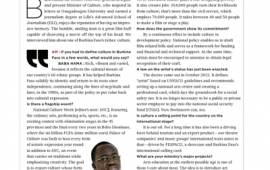BABA HAMA “PUTTING VALUE BACK INTO EXPRESSION”

Interview with the Minister of Culture and Tourism and former FESPACO general delegate.
Baba Hama, the former FESPACO general delegate and present Minister of Culture, who majored in letters at Ouagadougou University and earned a journalism degree at Lille’s Advanced School of Journalism (ESJ), enjoys the reputation of having an impressive memory. The humble, smiling man is a great film buff capable of dissecting a movie off the top of his head. We interviewed him about one of Burkina Faso’s riches: culture.
AM : If you had to define culture in Burkina Faso in a few words, what would you say?
BABA HAMA : Rich, vibrant and varied, because it reflects the cultural mosaic of our country’s 60 ethnic groups. It has helped Burkina Faso solidify its identity and return to its roots since independence, continuing along the lines of negritude and later, in the 1980s, as part of the policy to put value back into cultural expression.
Is there a flagship event?
National Culture Week [editor’s note: SNC], featuring the culinary arts, performing arts, sports, etc., is an exciting contest with elimination stages in the 45 provinces and the final every two years in Bobo-Dioulasso, where the six-billion-FCFA (nine-million-euro) Palace of Culture was built to host every form of artistic expression year round in addition to SNC, an event that carries on traditions while emphasizing creativity. The goal is to export culture whose form and presentation meet international standards.
Is culture a development driver today?
More than ever. It has even been included in the Accelerated Growth and Sustainable Development Strategy (SCADD).We’re convinced culture plays a role in fighting poverty. It also creates jobs: 164,000 people earn their livelihoods from culture; that’s more than the civil service, which employs 70,000 people. It takes between 40 and 50 people to make a film or stage a play.
How does the government show its commitment?
By a continuous effort to include culture in development policy. National policy enables us to draft film-related bills and serves as a framework for funding and financial and technical support. At the same time, artists must be encouraged to unionise to obtain legal recognition of their craft.
A law on the artist’s status has just been enacted.
The decree came out in October 2012. It defines “artist” based on UNESCO guidelines and recommends setting up a national arts centre and creating a professional card, which lays the groundwork for a social safety net. It is no longer necessary to be a public or private sector employee to pay into the national social security fund [CNSS]. Now freelancers can, too.
Is culture a selling point for the country on the international stage?
It is our oil. For a long time it has also been a driving force behind tourism and an export product our theatre companies’ and music groups’ international tours attest to that driven by FESPACO, a showcase and Burkina Faso’s international calling card.
What are your ministry’s major projects?
Arts education at the earliest possible age is one of those I care about most. The idea is to introduce art classes drawing, sculpture, music, etc. in schools on an equal basis with biology and mathematics. We’re training teachers in those subjects.
By Sarah ELKAÏM